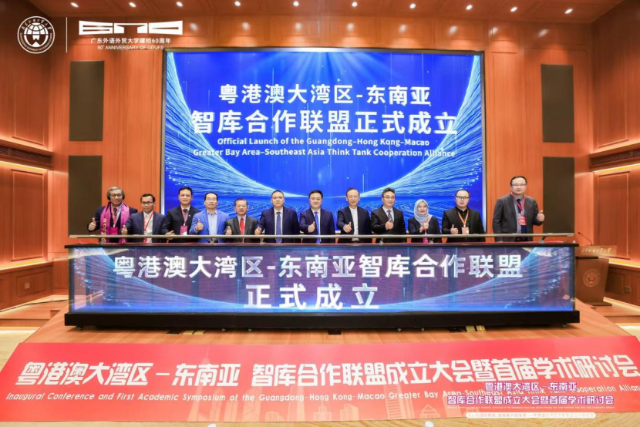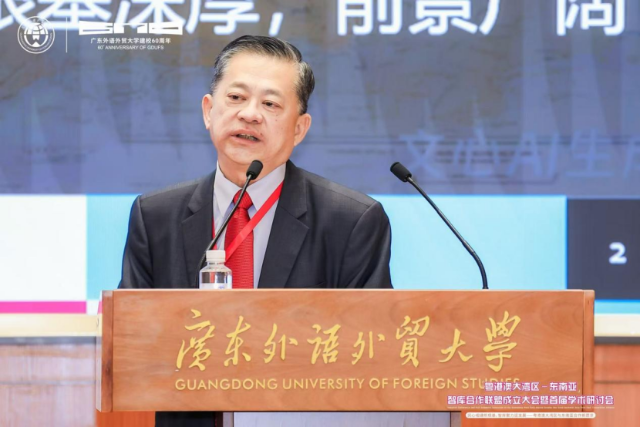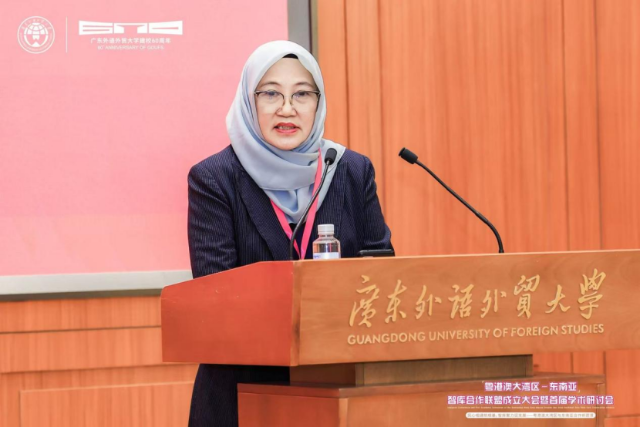
Guests launch Guangdong-Hong Kong-Macao Greater Bay Area - Southeast Asia Think Tank Cooperation Alliance in Guangzhou on Nov. 21, 2025.
The inaugural conference of the Guangdong-Hong Kong-Macao Greater Bay Area (GBA) - Southeast Asia Think Tank Cooperation Alliance kicked off in Guangzhou on November 21 to boost mutual exchanges.
Organized by the Guangdong University of Foreign Studies (GDUFS), the event witnessed the first batch of 22 renowned universities, research institutions, and think tanks from the GBA and seven ASEAN countries, namely, Indonesia, Malaysia, Thailand, Vietnam, Singapore, Cambodia, and Laos.
During the first academic symposium at the conference, scholars and heads of the 22 listed units spoke on the occasion and made their suggestions for fostering mutual understanding via the think tank alliance.

Liu Zhiqiang addresses the first academic symposium at the conference in Guangzhou on Nov. 21, 2025.
"The GBA and ASEAN have significant complementary industrial advantages, and deepening cooperation between the two sides presents enormous potential and opportunities," noted Liu Zhiqiang, Dean of the Southeast Asian Studies Institute at GDUFS.
Liu detailed three priorities for his institute. First, it will continue to cultivate high-level talents proficient in Southeast Asian languages and cultures, and train high-level talent in Chinese and humanities for Southeast Asian countries.
Additionally, the institute will cultivate high-level talent in the fields of international law, global governance, and international communication.
Second, the institute will focus on Southeast Asian countries to publish a series of works related to China and Southeast Asia.
Third, it will continue to hold relevant think tank forums to provide intellectual references for cultural exchanges between China and Southeast Asia, solidifying the foundation for cultural exchanges and promoting country and area studies.

Lim Chuan Boon addresses the first academic symposium at the conference in Guangzhou on Nov. 21, 2025.
Lim Chuan Boon, President of The Translation and Creative Writing Association of Malaysia, stated that think tanks are not merely incubators of ideas. The crucial point is how to translate the works produced by think tanks into practical exchanges between the communities of the two regions.
"Addressing the cultural differences between the GBA and Southeast Asia, minimizing cultural conflict, and deepening mutual understanding between the two regions—these are the imperatives," he added.

Trina Fizzanty addresses the first academic symposium at the conference in Guangzhou on Nov. 21, 2025.
Trina Fizzanty, Head of the Research Centre for Education at the National Research and Innovation Agency (BRIN) in Indonesia, claimed that many Southeast Asian countries exhibit significant diversity in their populations and cultures while also sharing many similar traditional values and cultural connections.
"We face numerous common challenges, and each country needs to contribute its own local wisdom when confronting and resolving its social problems. This local wisdom, combined with our shared experiences and knowledge, can better guide us in developing solutions," she added.
She then proposed that if the GBA and other Southeast Asian countries can approach social issues from a problem-solving perspective, continuously explore new ideas and viewpoints, enhance talent capabilities, and promote research and innovation, they can significantly help countries in the region address issues such as energy and water and continuously improve the quality of life for their people.
Additionally, the 22 listed units announced the Declaration on the Establishment of the Guangdong-Hong Kong-Macao Greater Bay Area-Southeast Asia Think Tank Cooperation Alliance.
It aims to elevate GBA-ASEAN cooperation to higher levels and broader domains, thereby contributing wisdom and expertise to regional peace, stability, and prosperity.
Reporter: Zhang Ruijun
Photo: Guangdong University of Foreign Studies
Editor: Yuan Zixiang, James Campion, Shen He
















